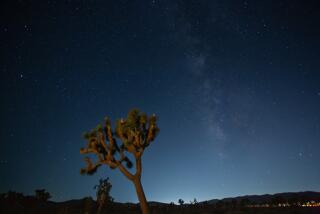If even the suns are doomed, what immortal glory : will be found by hitching your memory to a star?
- Share via
Man’s vainest yearning is his wish to be remembered long after he is gone; to leave behind him on Earth some marker that will remind his descendants, into eternity, that he passed this way.
Actually, most of us can’t expect to be remembered beyond the third or fourth generation; and not even then, unless we are especially good, and leave a lot of land and money; or especially bad, and become a legend.
But the yearning cannot be repressed. That’s why graveyards prosper, and there will always be tombstone cutters.
The record of man’s presence on Earth is so brief--only a few thousand years--that we still have the illusion that our heroes will be remembered for all time; that they will remain forever in the human consciousness through the monuments erected in their honor.
Thus, we will never forget the brooding Lincoln of the Memorial; the victorious Nelson of Trafalgar Square; the serene Ramses the Great, contemplating the known world from his four colossal statues at Abu Simbel; the imperial Marcus Aurelius, forever mounted on his bronze steed in Michelangelo’s piazza; and, carved for the ages in the granite of Mt. Rushmore, the faces of Washington, Jefferson, Lincoln and Teddy Roosevelt.
But, alas, the faces of Mt. Rushmore will be worn away, too, one day, even as the mountains themselves are leveled by the tears of time. Trafalgar Square will someday be dug up by archeologists who will come upon the vain little man in the admiral’s hat and say, “And who was this funny fellow?”; our brooding Lincoln will be pulverized, perhaps in the first intercontinental nuclear mistake; Ramses in time will surrender to the encroaching freeze of the nuclear night; and the Rome of Marcus Aurelius will lie nine cities down, like Troy.
How, then, are we to leave our mark, never to be forgotten?
A reader, Robert B. Inkelas of Santa Monica, thinks he has found the answer. He has sent me a little leaflet advertising “The Gift that Lasts Forever.”
For $35--send your money in with the ad, get a $5 discount--you can have a star named for you--a real star--or for anyone else you name.
I had heard a few pitches for this new scheme on my car radio, but had never seen it in writing before. Here it is:
“Imagine the unending Cosmos, linked for eternity with someone you love. Now, honor your children, parents, or that special person by having the International Star Registry name a real star after them. The name you select will be permanently recorded in the Copyright Office of the Library of Congress, and in the Registry’s vaults in Switzerland.
“The recipient of your unique gift will receive a 12” by 16” hand-inscribed parchment, two sky charts, and actual telescope coordinates for locating their star in the night sky. All sent in a sturdy gift box along with the booklet ‘Our Place in the Cosmos . . . . ‘
“Follow in the footsteps of great people who already have their place in the stars: Harry James, Andy Williams, Frank Sinatra and Bette Davis are among the many . . . . “
At first glance it’s a staggering idea.
Imagine looking out into the black night and seeing a distant star blinking at you and being able to say, “That’s my star--that’s Jack Smith!”
It might seem funny calling a star anything as plain as Jack Smith, compared with Alpha Centauri, Sirius, Groombridge, Epsilon Indi, and even, for that matter, Frank Sinatra.
Just imagine, having a star with your name burning out there in space, forever, twinkling out your message to the Earth: Jack Smith was here!
But it’s hard to imagine there being very many of anything as big as stars. Don’t worry. Carl Sagan tells us, in “Cosmos,” that there are more stars in the cosmos than there are grains of sand on all the beaches of the world. At least.
A galaxy is composed of billions upon billions of stars; our own galaxy, our Milky Way, has about 100 billion; and there are some 100 billion galaxies. So there are plenty of stars to go around, although you can’t expect to see your own star.
But what about permanence? Will it hang out up there for you forever, a great glowing ball of hydrogen and helium, burning at 40 million degrees at its core throughout eternity? No, alas; in time even the brightest star will burn itself out from all this constant internal combustion and radiation, and collapse inward into a hard hot mass called a white dwarf, or worse, a black hole.
In its death throes, even our sun, like other stars, will flare out into a red giant, engulfing the nearer planets and perhaps even the Earth--at last melting our icecaps, boiling our oceans and roasting us all, together with our little houses, institutions and monuments.
So even the stars are doomed; and there isn’t much point in having one named for you if it’s just going to burn out on you.
Anyway, International Star Registry has been discredited by astronomers, who say that only the International Astronomical Union can name stars, and that people who pay for having a star named after them might as well throw their money into a black hole, which is nothing but a very dead, very dense star.
I think what I’ll do, for my own immortality, is go down to our house in Baja and go down to the beach and find a likely looking grain of sand, and name it Jack Smith, and throw it back in.
More to Read
The biggest entertainment stories
Get our big stories about Hollywood, film, television, music, arts, culture and more right in your inbox as soon as they publish.
You may occasionally receive promotional content from the Los Angeles Times.










